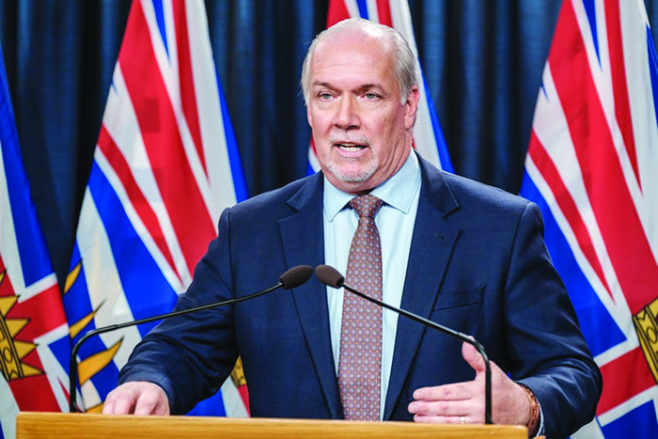The province of B.C. is taking a phased approach to mitigate the impacts of COVID-19 pandemic.
The four-phase plan provides guidance for individuals and businesses.
On Wednesday (June 24), B.C. began Phase 3.
Under Phase 3, people can take part in smart, safe and respectful travel within B.C.
Reminder: International travellers returning to B.C. are required by law to self-isolate for 14 days and complete a self-isolation plan.
People are reminded to limit the number of people in their bubble, which includes members of your immediate household and can be carefully expanded to include others.
Remember, vigilant hand-washing and space cleaning is still important.
In personal settings when you’re seeing friends and family who aren’t in your bubble, only get together in small groups of two to six people.
Keep two metres of physical distance from those who are outside your bubble and limit your time together.
“Thanks to the hard work and sacrifice of British Columbians, and under the guidance of the provincial health officer, we are now entering Phase 3 of our four-phase restart plan,” Premier John Horgan said in a news release.
“As we carefully turn up the dial on our activity, we can now look to travel safely around the province. But as we hit the open roads this summer, we must remember we are not leaving COVID-19 behind, and we need to continue to do our part to bend the curve and protect the progress we’ve made,” Horgan said.
British Columbians who wish to travel within B.C. this summer are advised to plan ahead and be respectful while visiting communities, especially smaller and rural towns.
The provincial health officer has laid out travel guidelines for everyone travelling to and within B.C.:
* pre-trip planning and research on available resources at arriving destination;
* respecting any local travel advisories to isolated and remote communities;
* no travelling for anyone who is sick, and if symptoms develop while travelling – self isolate immediately and contact 811 for guidance and testing;
* practising safe physical distancing of two metres at all times;
* spending time in small groups and open spaces; and
* practising good hygiene, including frequent handwashing and cleaning.
“Like other activities during our COVID-19 pandemic, summer holidays and travel will be different this year,” Horgan said.
“We are asking British Columbians to be respectful of the communities you travel to and do your research before you leave. We will help people get the tools and information they need to navigate this new normal safely,” the premier said.
WorkSafeBC, public health officials and industry representatives have developed guidelines for hotels and resorts, parks, the film industry and select entertainment, like movie theatres, and businesses in these sectors have already begun to open with COVID-19 safety plans in place.
“We’ve succeeded in flattening the curve by working together, but COVID-19 will continue to be in our province until we have an effective treatment or vaccine. By staying vigilant and following our foundational rules, we can safely do many of the things that we enjoy for the months to come,” said Dr. Bonnie Henry, provincial health officer.
The government has also formally extended the provincial state of emergency, allowing Mike Farnworth, Minister of Public Safety and Solicitor General, to continue to use extraordinary powers under the Emergency Program Act to support the Province’s COVID-19 pandemic response. The state of emergency is extended through the end of the day on July 7, 2020, allowing government to continue to take the necessary steps to keep British Columbians safe.
“We’re extending the provincial state of emergency, while we work to keep the economy moving and provide more opportunities for B.C. businesses to welcome our communities back,” Farnworth said. “We’ve also introduced legislation that will allow us to put longer-term solutions in place, so we can continue to provide the support British Columbians need to get through this crisis.”
On Monday, June 22, 2020, government introduced the COVID-19 Related Measures Act, legislation to allow provisions created for citizens and businesses in response to the COVID-19 pandemic to continue as needed after the provincial state of emergency ends.
On June 24, Adrian Dix, Minister of Health, and Dr. Henry, B.C.’s provincial health officer, announced 14 new cases of COVID-19, for a total of 2,849 cases in British Columbia.
There are 162 active cases of COVID-19 in the province and 2,516 people who tested positive have recovered.
Of the total COVID-19 cases, 14 individuals are hospitalized, seven of whom are in intensive care. The remaining people with COVID-19 are recovering at home in self-isolation.
Since the start of the pandemic, there have been 963 cases of COVID-19 in the Vancouver Coastal Health region, 1,491 in the Fraser Health region, 131 in the Island Health region, 199 in the Interior Health region and 65 in the Northern Health region.
There has been one new COVID-19 related death in the Vancouver Coastal Health region, for a total of 171 deaths in British Columbia.








